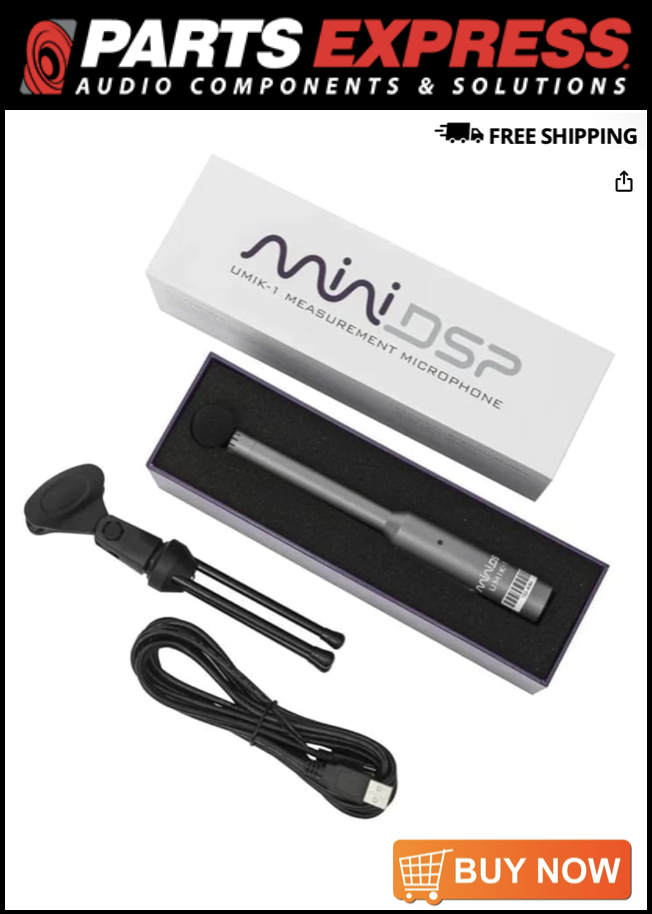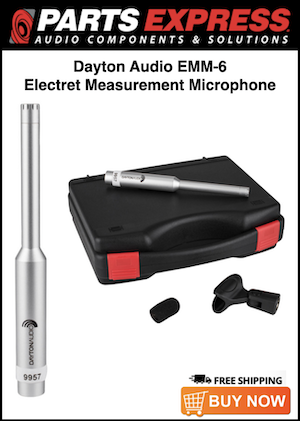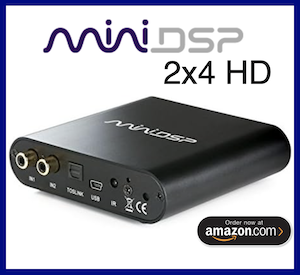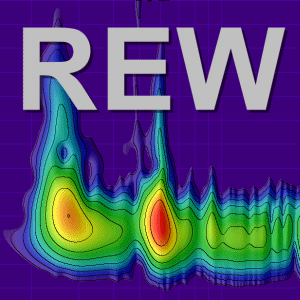Tom Holman
Registered
Thread Starter
- Joined
- Sep 18, 2024
- Posts
- 2
REW V5.31.3 running Azul Systems, Inc. JRE 1.8.0_422 64-bit on OS X 14.6.1
Audio Midi Setup Scarlett 2i2 in and out
Focusrite Scarlet 2i2 2nd gen (2017)
On REW
Preference page set as follows
Sample rate 96 kHz
Output device Scarlett 2i2 USB
Buffer 256k
Output Default Output L
Timing reference output L
Input Device Scarlett 2i2 USB
Input Default Input L
Virtual balanced input not checked
Loopback input R
Input options only –25.2 dBFS
Soundcard calibration
Scarlett 2i2 USB Default Output at 96 kHz
Cal file rwe.cal
Levels ISSUE. No external input pulldown per instructions; used main speaker instead but also used IEC 942 calibrator at 94 dB SPL instead, with an adapter making a good seal to the mic.
I proceeded despite having “wrong” input.
Mic on calibrator.
Level 1 adjusted for –20 dBV on “In” meter for 1 Pa.
Hit next
Level 2 adjusted for –20 dBV on “Reference” meter. N.B. Monitor level also affects the reading.
“Out” meter reads –25.2 which is how it was set on the preferences page.
Press Finish. Meters freeze.
Re-set Input Options Sweep Level to –20 dBFS and perform steps as above.
That makes the Reference In level go up so recalibrated it so now all meters show –20 dBFS.
Now I’m remembering the reason for –25.2. The speaker under test is a 4 Ohm one and I wanted 1 W in 4 Ohms = 2 Vrms instead of the usual 1 W in 8 ohms = 2.83 Vrms. Since there’s only a fixed-gain wideband power amp after this, the output level of REW was set to produce 2 Vrms on the output of the power amp as measured with a Fluke 8050A true rms meter.
So I’ll go back to –25.2.
Now go to main menu SPL meter. Set it to SPL or LEQ, Z weighted (or C or A) and Slow. With and without HP. Scale below reads –20.0 dBFS. Main window reads 95.7 dB. Is the mic cal file involved in an offset—it shouldn’t be for a calbrator that is absolute SPL. TBD? Do I need to offset the cal file?
Here the calibrate button does have the Use an external signal option. That pulls us
“Adjust the SPL figure below until it matches the reading on YOUR OWN SPL meter (Not the REW meter), then click ‘Finished.”
Here I’m a bit at a loss. I’m not calbrating to an external loudspeaker but to a 94 dB calibrator, so I think it’s supposed to be 94. Let’s try it. Yes that worked resetting the reading to 94 with headroom to 116. Solved though it wasn’t clear what to do.
NOW we have the mic calibrated (with a correction curve for a dead s/n mic so I’ll replace the file. BTW I originally made my own free-field to pressure calibration (and used the mic 90° to the incident sound on a rig that prevents reflections back into the mic. The Earthworks is about 3/8” face diameter (which is what counts for this, not the active area) so I used B&K 1/2” and 1/4” data and interpolated. Now however in the last few years Earthworks got the bug and supllies a correction curve. Yeeha. I also came by some longer B&K 1/4” both free-field and pressure mics ex NASA so I’ll be able to check the Earthworks.
N.B. Per Bruel working a very long time ago set the output polarity of his microphones to be negative voltage for positive pressure as that’s just the way it came out. This is often missed, The Earthworks mic is more conventional especially because it has an XLR and is phantom powered: pin 2 hot for positive pressur.
_______
That side having been done, I’ll move on to the output and power amp.
Using the headphone output as most convenient. Set it to 2.0V at the power amp output.
Made curves in file attached,
Anomalies:
I have asked the manufacturer for Excel files of their LMS response. We shall see how they respond.
My setup is anechoic with the windowing except: one side of the box has a several inch diameter rounded corner for low diffraction. The other side is a smooth flat surface to the floor mimicking the speaker in its use case.
How can I get the level and response more correct? Thanks very much. I hope enough information has been provided,
Audio Midi Setup Scarlett 2i2 in and out
Focusrite Scarlet 2i2 2nd gen (2017)
- Trying to calibrate microphone level. Ref Connection is out 1 L in 2. Mic is in 1 and +48V is on. Mic is Earthworks M23 supplied with a cal file and a correction file for free-field to pressure calibration (not yet put in, old one in place, was replaced by them under warranty recently). It’s not clear in your or Focusrite’s instructions Whether these are three conductor balanced or two conductor unbalanced connections.
On REW
Preference page set as follows
Sample rate 96 kHz
Output device Scarlett 2i2 USB
Buffer 256k
Output Default Output L
Timing reference output L
Input Device Scarlett 2i2 USB
Input Default Input L
Virtual balanced input not checked
Loopback input R
Input options only –25.2 dBFS
Soundcard calibration
Scarlett 2i2 USB Default Output at 96 kHz
Cal file rwe.cal
Levels ISSUE. No external input pulldown per instructions; used main speaker instead but also used IEC 942 calibrator at 94 dB SPL instead, with an adapter making a good seal to the mic.
I proceeded despite having “wrong” input.
Mic on calibrator.
Level 1 adjusted for –20 dBV on “In” meter for 1 Pa.
Hit next
Level 2 adjusted for –20 dBV on “Reference” meter. N.B. Monitor level also affects the reading.
“Out” meter reads –25.2 which is how it was set on the preferences page.
Press Finish. Meters freeze.
Re-set Input Options Sweep Level to –20 dBFS and perform steps as above.
That makes the Reference In level go up so recalibrated it so now all meters show –20 dBFS.
Now I’m remembering the reason for –25.2. The speaker under test is a 4 Ohm one and I wanted 1 W in 4 Ohms = 2 Vrms instead of the usual 1 W in 8 ohms = 2.83 Vrms. Since there’s only a fixed-gain wideband power amp after this, the output level of REW was set to produce 2 Vrms on the output of the power amp as measured with a Fluke 8050A true rms meter.
So I’ll go back to –25.2.
Now go to main menu SPL meter. Set it to SPL or LEQ, Z weighted (or C or A) and Slow. With and without HP. Scale below reads –20.0 dBFS. Main window reads 95.7 dB. Is the mic cal file involved in an offset—it shouldn’t be for a calbrator that is absolute SPL. TBD? Do I need to offset the cal file?
Here the calibrate button does have the Use an external signal option. That pulls us
“Adjust the SPL figure below until it matches the reading on YOUR OWN SPL meter (Not the REW meter), then click ‘Finished.”
Here I’m a bit at a loss. I’m not calbrating to an external loudspeaker but to a 94 dB calibrator, so I think it’s supposed to be 94. Let’s try it. Yes that worked resetting the reading to 94 with headroom to 116. Solved though it wasn’t clear what to do.
NOW we have the mic calibrated (with a correction curve for a dead s/n mic so I’ll replace the file. BTW I originally made my own free-field to pressure calibration (and used the mic 90° to the incident sound on a rig that prevents reflections back into the mic. The Earthworks is about 3/8” face diameter (which is what counts for this, not the active area) so I used B&K 1/2” and 1/4” data and interpolated. Now however in the last few years Earthworks got the bug and supllies a correction curve. Yeeha. I also came by some longer B&K 1/4” both free-field and pressure mics ex NASA so I’ll be able to check the Earthworks.
N.B. Per Bruel working a very long time ago set the output polarity of his microphones to be negative voltage for positive pressure as that’s just the way it came out. This is often missed, The Earthworks mic is more conventional especially because it has an XLR and is phantom powered: pin 2 hot for positive pressur.
_______
That side having been done, I’ll move on to the output and power amp.
Using the headphone output as most convenient. Set it to 2.0V at the power amp output.
Made curves in file attached,
Anomalies:
- The overall level seems very high compared to the rated sensitivity of the drivers which is 83.5 dB. It’s not known for sure whether that’s with 2V or 2.83V drive, but either is way off. Have asked manufacturer for clarifiation.
- The manufacturer’s data is made with LinearX LEAP and does not show a major dip at 1 kHz as this does. I have tried multiple speakers in various oritentations and I always seem to get this dip.
- The tweeter shows a dip at 1.2 kHz in their data but I see one at 950 In their data.
I have asked the manufacturer for Excel files of their LMS response. We shall see how they respond.
My setup is anechoic with the windowing except: one side of the box has a several inch diameter rounded corner for low diffraction. The other side is a smooth flat surface to the floor mimicking the speaker in its use case.
How can I get the level and response more correct? Thanks very much. I hope enough information has been provided,














